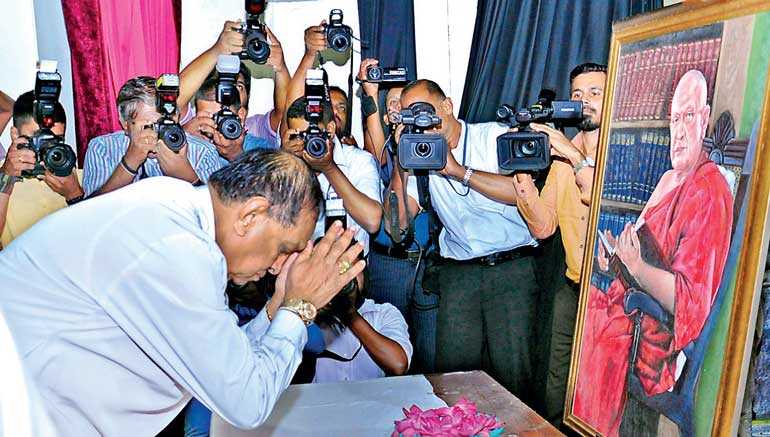Monday Feb 23, 2026
Monday Feb 23, 2026
Friday, 9 November 2018 00:00 - - {{hitsCtrl.values.hits}}

Speaker Karu Jayasuriya paying respects to the late Ven. Maduluwawe Sobhitha Thero
– Pic by Sameera Wijesinghe
Sounding a dire warning, veteran political scientist Prof. Jayadeva Uyangoda yesterday severely criticised what he termed as an open and ongoing violation of the Constitution, which could plunge the country into anarchy, unless there was moral intervention by the public and community leaders.
Delivering the commemorative oration at the ceremony held to mark the third death anniversary of Sobhitha Thero, Prof. Uyangoda drew stark parallels with Sri Lanka’s past and lauded Sobhitha Thero as a visionary leader who had always stood for democracy, at times by himself. However, this latest crisis threatens to dwarf all previous struggles endured by Sri Lanka’s democracy and could well end in a crisis of never-before-seen proportions unless the moderate and mature public step up to demand redress. President Maith-ripala Sirisena was a notable absentee at the event, which he had attended on two previous occasions.
“It is clear now that those who have created the crisis are struggling to settle it. They are now trying to find solutions for the crisis that began with violating the Constitution once, through violating the same further. Right now they are discussing how they can further violate the Constitution,” he told the gathering.
“The capacity for this crisis to be solved peacefully and intellectually is fast closing. This is a very dangerous situation and it cannot be addressed through just political means but the contribution of moral intervention is also needed.”
Prof. Uyangoda called for a broad front to be established with the inclusion of religious leaders, community leaders, intellectuals, the elderly and respected citizenry as well as civil society activists to intervene to end the constitutional standoff.
“It has to happen today. To prevent this political crisis leading to bloodshed and violence,” he stressed.
Describing the situation as a multifaceted crisis, with economic, political, constitutional, institutional and political moral implications, he observed that the conflicts that had developed among the three main political forces in the country over the last few years had now escalated to an open power struggle to take over state power.
“The battle that was earlier among three parties has now become a confrontation between two parties. The citizens who are supposed to be living in the sovereignty of a democracy have been reduced to powerless observers of this struggle. The house of representatives of the people, the Parliament, has been closed, it has been taken over by the Executive.
“It is now time to revive the thinking of Sobhitha Thero to abolish the Executive Presidency. In the next few days the current power struggle between the two political camps will turn out to be an open power struggle between the Executive Presidency and Parliament,” he asserted.
Describing the standoff as an “epic battle” that could have “serious and dangerous consequences”, Prof. Uyangoda warned that the confrontation could only be moderated if mature political understanding held sway over those who were attempting to undermine democracy.
“If there is no peaceful solution for this soon, this will lead to a conflict that will only be settled through brute force. This is not a crisis that can be taken lightly and this is a crisis that is worsening every day and ways of settling this battle through peaceful means should be explored by Sri Lankans with a mature political consciousness.
“What is needed is intervention by civil society. We need to act quickly and it must a moral intervention and we must provide moral leadership to the nation and its leaders.”
Echoing the sentiments of Prof. Uyangoda, National Movement for Social Justice founder member Prof. Wijesuriya delivered a blistering criticism of President Maithripala Sirisena’s actions since assuming his current post apologising to Sri Lankans for the role played by him in spearheading the ‘Yahapalanaya Movement’ that eventually brought Sirisena to power.
“At this point I would request forgiveness. I can only say that our intentions were pure and we believed in the path that we embarked on in 2014. This is the third death anniversary of Sobhitha Thero and President Sirisena attended the first two but was always careful to refrain from making any promises of abolishing the Executive Presidency. Three years on he is not even here today,” he said.
Prof. Wijesuriya confessed that he was deeply disappointed with the events on 26 October and could not even muster the capacity to write to President Sirisena. He also appealed to lawmakers to put aside their political differences and unite to hold a vote in Parliament on 14 November to end the constitutional deadlock as any other move would push the country towards deeper chaos.
“We don’t have an issue with Mr. Rajapaksa. We have an issue with the fate of democracy, the rule of law and the civil liberties of Sri Lankans. It is essential to resolve this standoff in Parliament. Our request is that if you are people who have drunk mother’s milk please stand for the law and uphold the rights of the people. My worry is that the Speaker may not be able to control the events in Parliament on 14 November. They should know to resolve this problem in a civilised manner. Don’t destroy this country at this crucial moment,” said Prof. Wijesuriya.